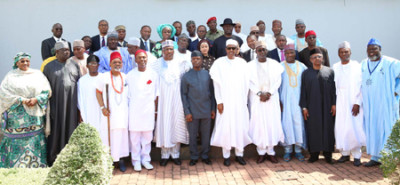 In the end, the Buhari administration — and by extension, his All Progressive Congress (APC) party — would have to account for raising domestic expectations far higher than his government appears willing (or able) to reach. Nonetheless, much of this failed expectations are not President Buhari’s doing ― although his party glad-handed promises in the run-up to his election. True, he, thereafter, promised a “new type of politics”. But, it would seem that some of us, “the people”, then assumed that this phrase also meant he was going to drive his new politics “with new people”. The main lesson from the composition of the new federal cabinet is that these notions are neither similar, nor coterminous.
In the end, the Buhari administration — and by extension, his All Progressive Congress (APC) party — would have to account for raising domestic expectations far higher than his government appears willing (or able) to reach. Nonetheless, much of this failed expectations are not President Buhari’s doing ― although his party glad-handed promises in the run-up to his election. True, he, thereafter, promised a “new type of politics”. But, it would seem that some of us, “the people”, then assumed that this phrase also meant he was going to drive his new politics “with new people”. The main lesson from the composition of the new federal cabinet is that these notions are neither similar, nor coterminous.
This latter extension of our understanding of the now old “new” president’s spiel explains the vitriol that welcomed the inauguration of the federal cabinet in parts of the country.
Yet, in the anger and angst directed at the “sub-par composition” of the cabinet lies another popular error ― this error, though, is of a much older vintage. At the heart of this other gaffe is the response to the question “What are the functions of a federal minister?”. Sadly, in appraising the fit of the respective nominees for office, this question has been asked only in the breach. Still, to hear critics of President Buhari’s cabinet tell it, a minister is a hybrid savant — educated almost to the doctoral level, possessed of exceptional cross-sector competences, and with the execution capabilities of Apple Inc.
In truth, this definition has been with us for a while. It explains why no cabinet (across the three tiers of government) is complete without the odd professorial presence. In this sense, this approach to governing speaks to a much more fundamental failing of the national mindset: a distressing inability to connect the benefits that are derivable from a project with the costs that must be borne in executing the project.
Why, given the general acknowledgement of the poor state of our education system, is it okay to have professors shed the gown to become ministers and commissioners in town?
This query is that more poignant, when one pauses to consider the proper duties of a minister/commissioner. Stripped of its many appurtenances (including the siren-led convoys, and over-zealous jackbooted janissaries who pose as members of the minister/commissioner’s security details), it comprises functions no more complicated than one would meet with in the job description of an “effective manager”. S/he would, ordinarily, set her ministry’s targets within the context of the economic and development goals agreed by the government. Assign resources for delivering on these goals ― hopefully remembering to match goals with the highest impact with acknowledged resource constraints. And monitor execution.
Why, for instance, must the best research and teaching minds in our universities look to administrative appointments (a vice chancellorship, for instance) as the crowning moments of their careers? Would it not be better if we had “effective managers” run these institutions, ensuring that necessarily scarce resources reach those places where the need is most?
In a properly run ministry, the winnowing of goals in search of the combination most likely to lead through the fastest route to the agreed goals ought properly to fall to bureaucrats (with the minister ensuring that the entire process hews to government’s over-arching vision). Given our extreme resource constraints, it could then be argued that the minister comes into his or her own, in deciding the project (or combination thereof) that will deliver the most value for the largest number of Nigerians for every naira spent. Monitoring execution, on the other hand, is essentially a book-keeper’s task — simply to make sure that the ministry spends exactly as budgeted for the goals as described. To ensure, in other words the fidelity of the double-entry system.
Thus far, no rocket science is involved. And so, no rocket scientist is called for. Is President Buhari, thus, justified in describing his choice of ministers as “round pegs in round holes”? Time and the level of our continued tolerance for mediocre performance will tell. But until then, we may want to look at other sectors of the national life where similar misalignments of resources and tasks take place daily.
Why, for instance, must the best research and teaching minds in our universities look to administrative appointments (a vice chancellorship, for instance) as the crowning moments of their careers? Would it not be better if we had “effective managers” run these institutions, ensuring that necessarily scarce resources reach those places where the need is most?
Must every award-winning journalist own and run a newspaper (print or online)? Why not embrace a division of labour which gives to the manager responsibility for administrative matters, while the journalist focuses on reporting and editorial matters?
This list is near endless. However, the point is that our governance difficulties regularly involve us misallocating resources. And in ways that we often are ignorant of.
END

Be the first to comment